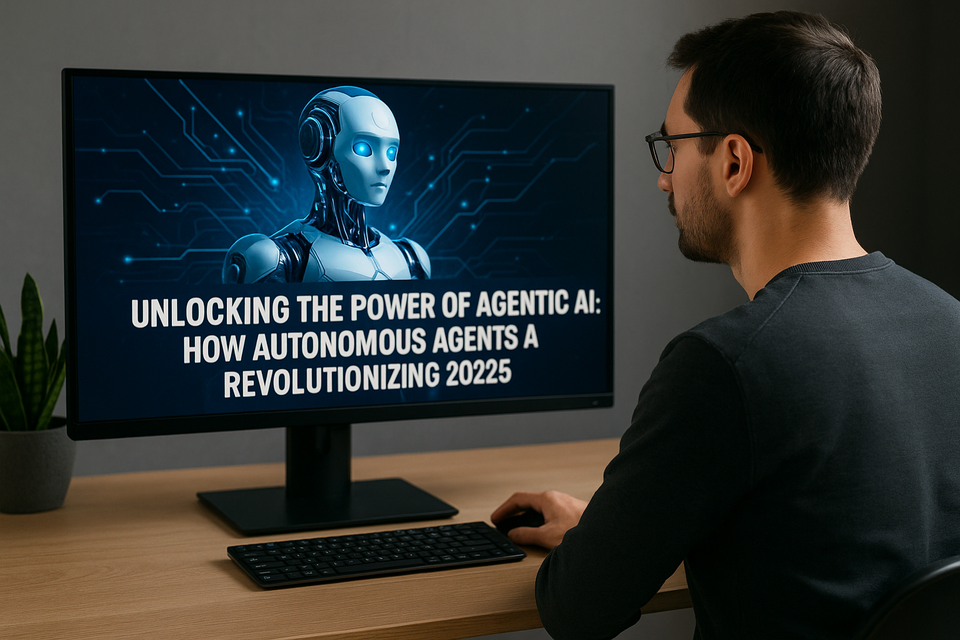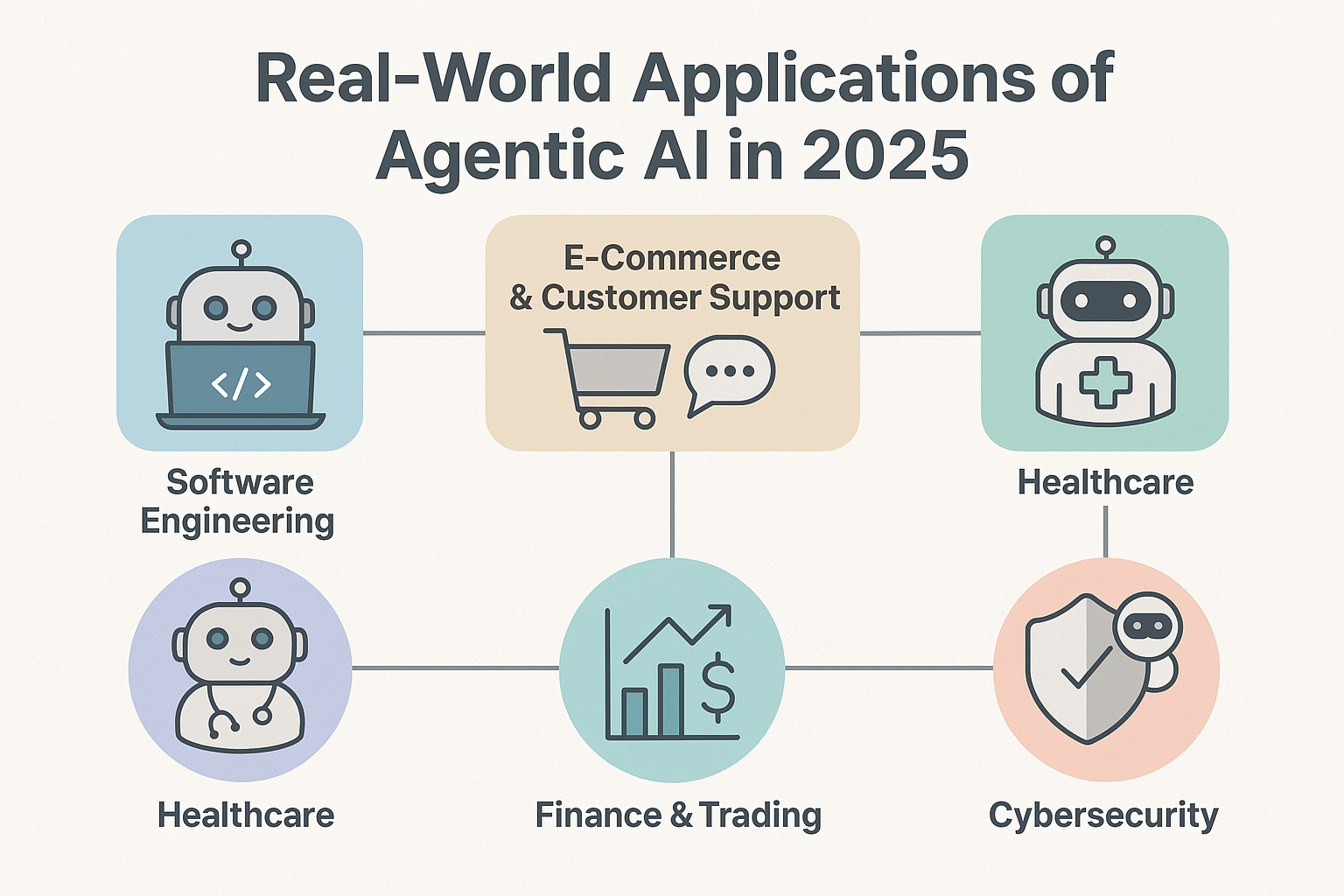Unlocking the Power of Agentic AI: How Autonomous Agents Are Revolutionizing 2025

Introduction
Artificial intelligence has been reshaping industries for years—but 2025 marks the dawn of something entirely new: Agentic AI. These aren’t your typical machine learning algorithms or chatbots. Agentic AI refers to autonomous agents that can perceive, plan, and act independently in complex environments with minimal human input.
Think of them as highly capable digital employees—or even collaborators—that manage tasks like customer support, inventory management, research, and even creative work without being micromanaged.
This technology is revolutionizing how we build software, run businesses, and imagine intelligence itself. In this article, we'll explore what Agentic AI is, how it works, and why it's changing the game in 2025.
🔍 Whether you're a developer, startup founder, or simply curious about the future—this is the shift you can’t afford to ignore.
What Makes Agentic AI Different?
While traditional AI systems follow predefined instructions or predict outcomes based on trained data, Agentic AI is an entirely different beast.
Think of it as the difference between:
- A calculator (traditional AI): It does one thing—well, fast, and repeatedly—but it only does what you ask it.
- A smart assistant that plans your week (Agentic AI): It understands context, goals, and makes decisions on its own—without being micromanaged.
Key Differences:
| Feature | Traditional AI | Agentic AI |
|---|---|---|
| Autonomy | ❌ No | ✅ Yes |
| Goal-Oriented Behavior | ❌ Limited | ✅ Yes |
| Multi-Step Planning | ❌ No | ✅ Yes |
| Real-Time Decision Making | ✅ Sometimes | ✅ Yes |
| Adaptive Learning | ✅ Limited | ✅ Yes |
| Human Interaction | Scripted | Natural & Interactive |
Real-World Example:
Let’s say you’re managing customer support:
- A traditional AI bot answers frequently asked questions.
- An agentic AI handles conversations, escalates issues, writes new help docs on the fly, and even flags business problems in real-time.
This makes Agentic AI incredibly powerful in environments where goals, people, or data are constantly changing.
Real-World Applications of Agentic AI in 2025
In 2025, Agentic AI is no longer confined to labs or startups. It’s actively transforming real-world industries.
Here are some of the most impactful examples:
1. Software Engineering
Agentic AI can:
- Analyze a feature request
- Write code autonomously
- Test it
- Push it to production
- And even monitor for bugs
All while collaborating with human developers in GitHub issues or Slack.
2. E-Commerce & Customer Support
- Agents automate customer service with natural language and empathy
- Track orders, process refunds, and make personalized product recommendations
- Anticipate complaints before they happen based on user behavior
3. Healthcare
- Agents triage patients, schedule appointments, and flag anomalies in health records
- Assist doctors in diagnosing rare diseases by researching medical journals on the fly
They’re like supercharged assistants with medical intuition.
4. Finance & Trading
- AI agents are now managing investment portfolios, analyzing news, and rebalancing in real-time
- Spot fraudulent activity faster than humans ever could
5. Cybersecurity
- Detect threats, quarantine systems, alert teams, and deploy fixes—before an attack is complete
- These agents even negotiate with ransomware bots autonomously (!)
Bottom Line:
Agentic AI is not just replacing old workflows—it’s creating new paradigms of work where software agents act like colleagues, not tools.

Agentic AI in the Real World: Applications Across Industries
The rise of agentic AI is more than a theoretical shift—it’s already changing how industries operate. Let’s explore how autonomous agents are actively being deployed in the real world:
1. Finance
AI agents in fintech can analyze markets in real-time, execute trades, detect fraud, and manage customer support with minimal human intervention. Their ability to learn and act independently allows financial institutions to reduce risk and improve efficiency.
2. Healthcare
In hospitals, agentic AI systems assist with diagnosing illnesses, recommending treatments, and optimizing patient care logistics. For example, an AI agent might automatically schedule patient appointments, analyze radiology scans, and alert physicians to urgent anomalies.
3. Retail & E-commerce
Autonomous agents are personalizing shopping experiences by dynamically adjusting product recommendations, pricing, and inventory. They can act as digital concierges, interacting with users to guide purchases and manage returns.
4. Smart Homes & IoT
Agentic AI powers smart home devices that adapt to user behavior. These agents learn your preferences and automate routines—like adjusting lighting, managing energy consumption, or ordering groceries before you even realize you’re low.
5. Cybersecurity
In the face of evolving threats, AI agents are essential for real-time threat detection and mitigation. They continuously monitor network activity, adapt to new attack patterns, and autonomously apply defense protocols.
The Benefits and Risks of Agentic AI
Agentic AI promises enormous advantages—but like any transformative technology, it also introduces new challenges. Understanding both sides of the coin is essential as we navigate its rise.
Benefits
- Scalability: Once trained, autonomous agents can scale operations without proportional increases in human resources, enabling massive growth.
- Efficiency: Agents can operate 24/7, make real-time decisions, and optimize systems much faster than humans.
- Personalization: From curated content to individualized healthcare plans, agents can tailor experiences based on unique user data.
- Cost Reduction: Automating tasks typically handled by human labor reduces overhead in many sectors.
Risks
- Loss of Control: Poorly supervised agents may act in ways that deviate from intended behavior, especially if goals are misaligned.
- Security Threats: Malicious use of agentic AI (e.g., autonomous hacking bots) could escalate cyber warfare.
- Job Displacement: As more roles become automated, entire job sectors may face disruption.
- Ethical Dilemmas: Autonomous decision-making raises questions about accountability, especially in life-critical domains like healthcare or law enforcement.
Agentic AI vs. Traditional AI
To fully grasp the significance of Agentic AI, it’s helpful to contrast it with traditional artificial intelligence systems.
| Feature | Traditional AI | Agentic AI |
|---|---|---|
| Task Autonomy | Executes predefined tasks | Defines and pursues its own goals |
| Reactivity | Responds to specific input | Proactively seeks new tasks or goals |
| Learning Scope | Learns from curated datasets | Learns through real-world interactions |
| Interaction Level | Often operates in isolated environments | Continuously interacts with systems and users |
| Examples | Spam filters, image classifiers | AutoGPT, BabyAGI, ReAct agents |
Key Takeaway
While traditional AI acts more like a tool, Agentic AI functions more like a co-worker or even a semi-independent entity. It doesn't just answer questions—it asks them, proposes solutions, and takes initiative.
Real-World Applications of Agentic AI in 2025
Agentic AI isn’t just a theoretical concept—it's already being implemented across industries and transforming how we work and live.
1. Business Automation
Companies are using agentic AI to automate complex workflows like:
- End-to-end customer support (responding, escalating, following up)
- Market research (scanning news, summarizing trends, drafting reports)
- Sales outreach (identifying leads, crafting emails, scheduling meetings)
2. Healthcare Assistants
Autonomous agents are helping doctors and nurses by:
- Monitoring patient vitals in real time
- Recommending treatment adjustments
- Managing administrative tasks like appointment scheduling
3. Scientific Discovery
Agentic systems can explore massive datasets to:
- Generate new hypotheses
- Design experiments
- Collaborate with researchers to accelerate innovation
4. Personal Productivity
Tools like AutoGPT and AgentGPT act as autonomous assistants for individuals:
- Planning travel itineraries
- Writing blogs or social media content
- Managing tasks and calendars
Benefits and Challenges of Agentic AI
As agentic AI takes center stage in 2025, it brings a host of benefits—along with important challenges that must be addressed.
Benefits
1. Increased Efficiency
Agentic AI reduces the need for constant human supervision, allowing businesses and individuals to automate complex tasks end-to-end.
2. Scalability
Once trained, a single agent can scale across multiple tasks and domains—making it easier to deploy solutions rapidly.
3. 24/7 Operation
Unlike human workers, autonomous agents don’t sleep. They continuously work, monitor, and adapt to new information in real-time.
4. Personalization
Agents can be tailored to fit individual user preferences and behavior, making services smarter and more intuitive over time.
Challenges
1. Safety and Control
Autonomous behavior introduces new risks. If not properly bounded, agents can perform unexpected actions or optimize for the wrong outcomes.
2. Ethical Concerns
Questions around fairness, accountability, and bias become more critical when decisions are made without human input.
3. Security
Agents that access sensitive systems or data must be hardened against misuse, manipulation, or breaches.
4. Regulation and Standards
There’s a growing need for clear legal frameworks to define how autonomous agents can operate in society.
The Future Outlook of Agentic AI
As we look beyond 2025, agentic AI is poised to move from early adoption to mainstream integration across nearly every aspect of life and industry.
What’s on the Horizon?
1. Hyper-Personal Agents
Future agents will become even more customized—acting as digital twins that understand our preferences, behaviors, and goals at a granular level.
2. Multi-Agent Collaboration
We’ll begin to see entire ecosystems of agents working together to solve large-scale problems—from managing smart cities to automating scientific research.
3. Regulated Autonomy
Expect an increase in governance frameworks. Just like traffic laws for cars, we’ll see “agent laws” that define acceptable behaviors and ensure alignment with human values.
4. Physical Integration
With the growth of robotics and IoT, agentic AI will extend beyond the digital realm into physical systems—managing warehouses, drones, and autonomous vehicles in real time.
A Paradigm Shift
The rise of agentic AI isn't just a technological shift—it’s a cultural one. As society adapts to living alongside intelligent, decision-making systems, our understanding of productivity, privacy, and agency will evolve.
Conclusion
Agentic AI is not just a trend—it's a transformative leap in how machines interact with the world around them. As we've seen, these autonomous agents are redefining the boundaries of what's possible, from managing complex workflows to independently navigating real-world environments.
2025 marks the beginning of a new era—one where AI systems are no longer mere tools, but collaborators capable of planning, adapting, and executing tasks without constant human intervention. The rise of agentic AI has the potential to democratize automation, empower creators, and unlock new levels of productivity across industries.
However, with great autonomy comes great responsibility. As we continue to integrate these intelligent agents into society, developers, policymakers, and end users must work together to ensure that agentic AI remains safe, ethical, and beneficial to all.
If you're intrigued by the possibilities of Agentic AI, now is the time to explore, build, and participate in shaping the future.
What are your thoughts on agentic AI? Have you seen it in action, or built something with it? Share your experience in the comments!
📬 Want more content like this? Subscribe to our newsletter and get the latest insights delivered to your inbox.
💬 Enjoyed this article? Sign up to join the conversation and leave a comment below!
Member discussion